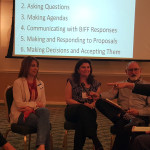
Collaborative Divorce: An Investment In Solutions Rather Than Accusations

“Frankly, I don’t care if she settles or not,” was his reply to her attorney. “I’d rather see her waste even more money like she made me do for these past four years.”
These were the words of a man broken and bitter from the battle. It was no longer about ending a marriage.
It was about winning the war.
Endless unsubstantiated accusations were hurled at each other just for spite, like children throwing spaghetti in a food fight without regard for the innocent bystanders who would also get dirty. And one by one, these accusations would become part of the permanent public court record.
When it was all said and done, and the dust had finally settled, both felt that the system had failed them. Neither had any money left to pay their attorneys, not to mention one another.
It’s hard to imagine that it all started with a single document filed with the Pinellas County Courthouse in 2008. In the beginning, Terry and Murielle simply wanted to divorce.
Yet after five years, four judges, six lawyers, and $400,000 in attorney and expert fees (for Terry alone), that single document had become 28 volumes.1
That single document had become a permanent testament to what can happen when divorce becomes more about winning than about ending a marriage.
This is an extreme case. And while only a small percentage of cases ever go this far, it does illustrate the extent to which a divorce can spiral out-of-control.
With traditional litigated divorce, couples enter a legal process that was never intended to end marriages. The legal system is based on a philosophy that the true facts of a given situation will emerge if the parties act as adversaries rather than cooperative participants.2 And while a marriage is a legal contract, it is also much more than that. The damage that can be inflicted extends beyond the named litigants to the children and extended family. They become casualties of friendly-fire in a war they never asked for.
Divorce can be an emotionally traumatic experience.
Many people experience a flood of conflicting emotions. They may feel a sense of betrayal, fear, resentment, anger and loss of control. When you put people who are experiencing one of the most difficult and traumatic emotional experiences of their lives through a process designed to prove who is right and who is wrong, it’s not going to end well. The system feeds off of antagonism. And even those with the best intentions can quickly veer off course onto a trajectory of destruction.
In the case of Terry vs Murielle, there were no winners.
There was only bitterness and lingering images of mom and dad acting badly scarred into the memory of a little boy.
And so, we must ask the question:
What might have been the outcome had they invested that same energy, time and money into the future of their restructured family?
(Because like it or not, while your marriage will end, your family will not.)
Collaborative Divorce
There is a better way and it’s called collaborative law.
Collaborative law enables spouses to invest in solutions.
Collaborative law is outcome focused and client/family centered. It is creative, less costly, confidential, customizable, and convenient.
Creative
In a collaborative divorce, the parties work through the issues with the help of their respective lawyers and a team of collaborative professionals, to reach mutually acceptable solutions. They pledge not to go to court and to exchange all information openly and honestly. With the threat of litigation off the table, the fear and pressure that is often fostered by the uncertainties of the legal process are diminished. The parties become free to focus on crafting creative solutions that have considered the interests of everyone.
The collaborative team consists not only of attorneys, but mental health professionals, child specialists, divorce coaches, certified public accountants, and certified financial planners. Advisors such as mortgage bankers, real estate agents, and financial advisors can also be engaged when necessary to assist the parties.
Cost Less
In most cases, the collaborative divorce will cost significantly less than the traditional adversarial divorce process. Instead of each spouse hiring their own experts to tear each other down, they engage mutual, impartial, collaborative professionals who are experts at creating win-win solutions. Time and money is not wasted defending accusations that do not lead to solutions but only create more contention.
Confidential
Because meetings and communication take place outside the purview of the court system, the process is confidential and doesn’t become part of the public court record.
Custom Solutions
In the traditional litigated divorce, it is the judge who finally decides the what the future holds. In a collaborative divorce, the divorcing couple has complete control over the process and the final outcome.
Convenient
Unlike the traditional divorce process, the collaboratively divorcing couple has the flexibility to hold meetings according to their schedules. This not only saves time and money, but often results in a quicker resolution.
A Better Way
Collaborative divorce really is a better way. It isn’t right for everyone, and there are times when litigation is the only option. But in many cases, it is the best choice.
Are you curious to know whether the collaborative divorce process could work for you?
Click here to take a short 2-minute quiz and find out.
1. http://www.tampabay.com/features/humaninterest/the-divorce-from-hell-the-battle-for-alimony-and-emptied-pockets/2112875
2. http://www.tenant.net/Court/Legsystm/jud23.html







